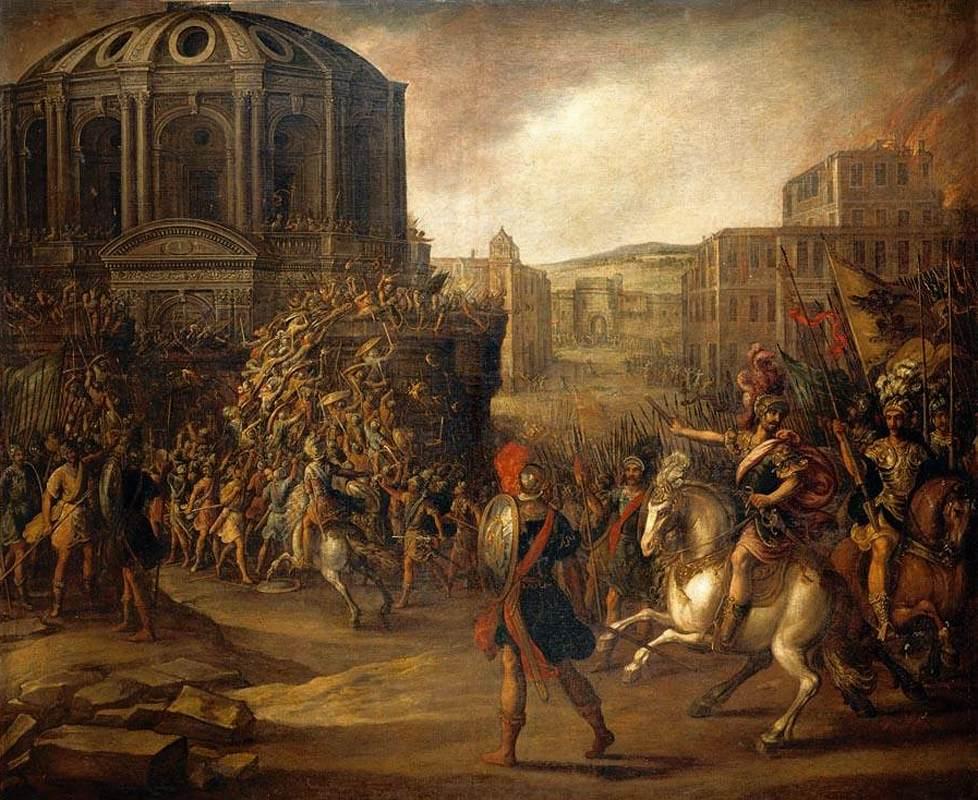[Greek] πολιτεία (politeia), [Latin] civitas: citizenship, commonwealth, community, freedom of a socio-economic group, administration, politics; Acts 22:28, Eph.2:12

Battle Scene with a Roman Army Beseiging: painting by Juan De La Corte (1597-1660). Tarsus, Paul’s birthplace, would have been an example of a city occupied by the Roman Empire.
Background Information:
Greek Hellenism: This term can refer to political acts (dealings), govt. departments, those who hold power, constitution, commonwealth, citizenship, and foreign colonies (with specific rights). Aeschines’ Against Timarchus 86 states, “He declared that there were certain men who were attempting to bribe members of the popular assembly and the courts as well.” Demosthenes’ Olynthiac 1 states, “The Olynthians are opened to the fact that they are now fighting not for glory, not for a strip of territory, but to avert the overthrow and enslavement of their fatherland.” Andocides’ On his Return 2.10 states, “Eventually, however, as was only natural, I was seized with a longing for the old life as a citizen among you which I had abhorred for my present place of exile.”
Old Testament: This term primarily does not mean civil rights, constitution, nor state. Rather, this term, having a religious and moral sense, refers to one’s “walk” or code of conduct inherited from the fathers and Mosaic Law. Only in 3 Maccabees does this term refer to civil rights. The high priest Jason sought to undermine Jewish piety practices with Hellenistic customs. Josephus references Hellenistic citizenship for the Jews in Alexandria. Philo, another Hellenistic philosopher, often intertwined Jewish moral laws and citizenship.
New Testament: This term, occurring only twice, means citizenship and people (of a population). Paul appeals to his Roman citizenship (being born in Tarsus) in order to avoid being scourged. Paul mentions that the Ephesians, alienated from Christ, Israel, and the covenants, were living a pagan lifestyle. The Ephesians were unable to participate in the spiritual citizenship with Israel. Once excluded from this promise, the Ephesians now have access to the Father through Christ. They have become members of God’s household and can partake of salvation.
Scripture:
“The commander replied, ‘I acquired this citizenship for a large sum of money.’ Paul said, ‘But I was born one.’” Acts 22:28
Paul’s Roman citizen by birthright allows him to avoid being scourged.
“They were at that time without Christ, alienated from the community of Israel and strangers to the covenants of promise, without hope and without God in the world.” Eph.2:12
The alienated Ephesians were essentially living a pagan way of life. Now the Ephesians can participate in this spiritual citizenship with Israel.
Tarsus: This birthplace of Paul is located in the Roman province of Cilicia (southern Mediterranean coast of present-day Turkey). Paul was proud of his status as a Roman citizen. There were essentially three ways of gaining Roman citizenship: by birth right, by buying the privilege, and obtaining an extensive military service. A Roman citizen had the following rights: to vote in assemblies, the right to for public office, the right to make legal contracts (hold property), the right to sue (and be sued), the right to have a legal trial, the right to have the ability to request Caesar to hear one’s case, the right not to be whipped (scourged), and the right not to receive the death penalty (with the exception of treason).
Conclusion:
Polite, politics, political, metropolitan, polity, civic
I suppose it is not surprising that human nature remains constant in any age in history. Just like today, as in Greco-Roman times, there were always those who sought political power, political deals, and even well-intentioned public service. There is also the time honored human motivation of wanting to live free from repression and tyranny and to be a good citizen.
I am not surprised that this term primarily focused on one’s walk with God according to the Hebrew traditions. However, it was interesting to discover examples of the classical definition of citizenship. Such examples include the Jews in Alexandria and the priest Jason’s imposition of Hellenistic practices on the Jews.
With the exception of Roman citizenship, the New Testament references spiritual citizenship belonging to the city of God. It was interesting to discover the rights that a Roman citizen has, including obtaining citizenship through military service.
Even today, immigrants can sometimes obtain expedited citizenship through military service. This concludes our World Govt. History 101 class. Thanks for your polite and civic participation!
